They are the siloviki, Russian for “men of force” — the men at the heart of President Vladimir Putin’s inner circle.
Fiercely loyal to the Kremlin line, they are Mr Putin's most trusted advisers. Many have a background in national security organisations such as the FSB, the successor to the Soviet Union's infamous KGB.
Russia watchers strongly believe that should Mr Putin ever hand over power, his successor will probably be from their number.
Sergey Shoigu, 66, General of the Army and Minister of Defence
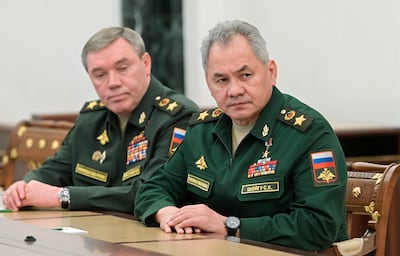
No one has the ear of Mr Putin at the moment than Gen Shoigu, head of the armed forces. Born in Chavan, a town in southern Siberia neighbouring Mongolia, his father was an ethnic Tuvan, indigenous to the region.
Rising to become minister of emergency situations in the 1990s, he was declared a hero of the Russian Federation before becoming minister of defence in 2012. He was reappointed in 2018 and 2020.
One of the architects of Russia’s intervention in Syria, his star may rise or fall depending on what happens in Ukraine.
Igor Sechin, 61, chairman and chief executive of Rosneft
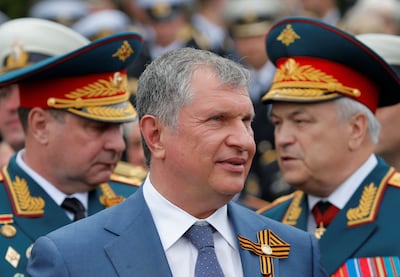
A leaked US embassy cable called him “the grey cardinal of the Kremlin”, the head of the state oil company is one of the closest siloviki to Vladimir Putin, and an oligarch.
As is the case with many of the president’s lieutenants — and they are all men — Mr Sechin comes from Leningrad, now Saint Petersburg, and was deputy prime minister from 2008 to 2012 after serving as Mr Putin’s deputy chief of staff in 2000.
Sometimes described as the president’s right-hand man, and a confidant since the early 1990s, his role at Rosneft has also made him extremely wealthy.
Mr Sechin was singled out for EU sanctions after the invasion of Ukraine, with French authorities seizing his $120 million yacht Amore Vero as it attempted to sail.
Nikolai Patrushev, 70, secretary of Russia's security council
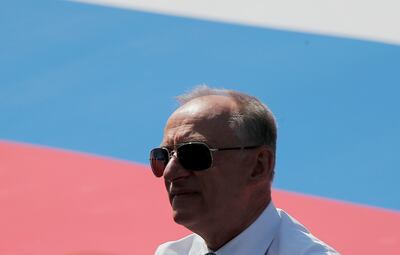
The political hawk’s hawk, Mr Patrushev has stated that the objective of the West in Ukraine is to “destroy the Russian Federation”. Sometimes described as the second most powerful man in Russia, he was born in Leningrad and began his rise to power under the old Soviet Union.
Joining the KGB in the 1970s, he became deputy director of the FSB in 1998 and director a year later. In 2008 he was made secretary of the Russia's security council, which advises Mr Putin.
Reports say he has known Mr Putin, who was also born in Leningrad, for about 50 years.
Alexander Bortnikov, 70, director of the FSB
Mr Bortnikov is another graduate of the KGB in Leningrad, where he is said to have first worked with Mr Putin. He was appointed director of the FSB in 2008, responsible for a huge network of agents that control all aspects of life in Russia, effectively strengthening Mr Putin’s grip.
His son, Dennis, is chairman of state-run VTB bank, which was hit with sanctions by US President Joe Biden, along with his father.
Sergey Naryshkin, 67, director of the Foreign Intelligence Service
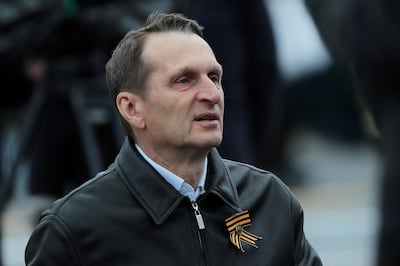
An economist and engineer by training, Mr Naryshkin studied at the Higher School of the KGB alongside Mr Putin and was appointed head of foreign intelligence in 2016.
On the eve of the invasion of Ukraine, Mr Naryshkin was publicly dressed down during a televised session of the National Security Council after he stuttered and fluffed the official line on Russia’s recognition of the Ukrainian enclaves of Donetsk and Luhansk, with Mr Putin telling him to “speak plainly”.
If it was also his advice as spy chief to Mr Putin that Russian soldiers would be welcomed as liberators by the people of Ukraine, his standing will be further eroded.
Sergey Ivanov, 69, special representative to the president
More important than his current role is Mr Ivanov’s close friendship with Mr Putin, forged in the KGB, where he eventually become the Russian president’s deputy.
He assumed the same role with the FSB, becoming minister of defence in 2001.
A hawk, he refused to rule out a nuclear first strike if it was in Russia’s interests, and argued strongly in a favour of military intervention in Syria. He also dismissed the fatal poisoning of FSB defector Alexander Litvinenko in 2006, saying he was “nothing. We didn't care what he said and what he wrote on his deathbed”.
He was placed under sanctions by the US after the invasion of Ukraine.
Dmitry Rogozin, 58, director general of Russian space agency Roscosmos
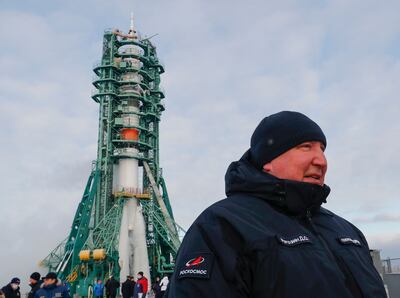
A former deputy prime minister and ambassador to Nato, Mr Rogozin was appointed head of Roscosmos in 2018.
A strong defender of Russian minorities in a number of former Soviet countries, he is outspoken on intervention, saying in 2015 that “tanks don’t need visas”.
He publicly threatened to detach the Russian section that provides propulsion to the International Space Station, sparking concerns that Moscow will let the station crash to Earth, and to abandon a Nasa astronaut in space as a result of America’s opposition to the Ukraine invasion.
Vyacheslav Volodin, 58, chairman of the State Duma
Mr Volodin is a politician in the lower house of the Russian parliament and former deputy prime minister. One of a new generation of younger siloviki, he is a former aide to Mr Putin and worked on his last election campaign.
He has been named as a possible successor should Mr Putin step down in the future.









